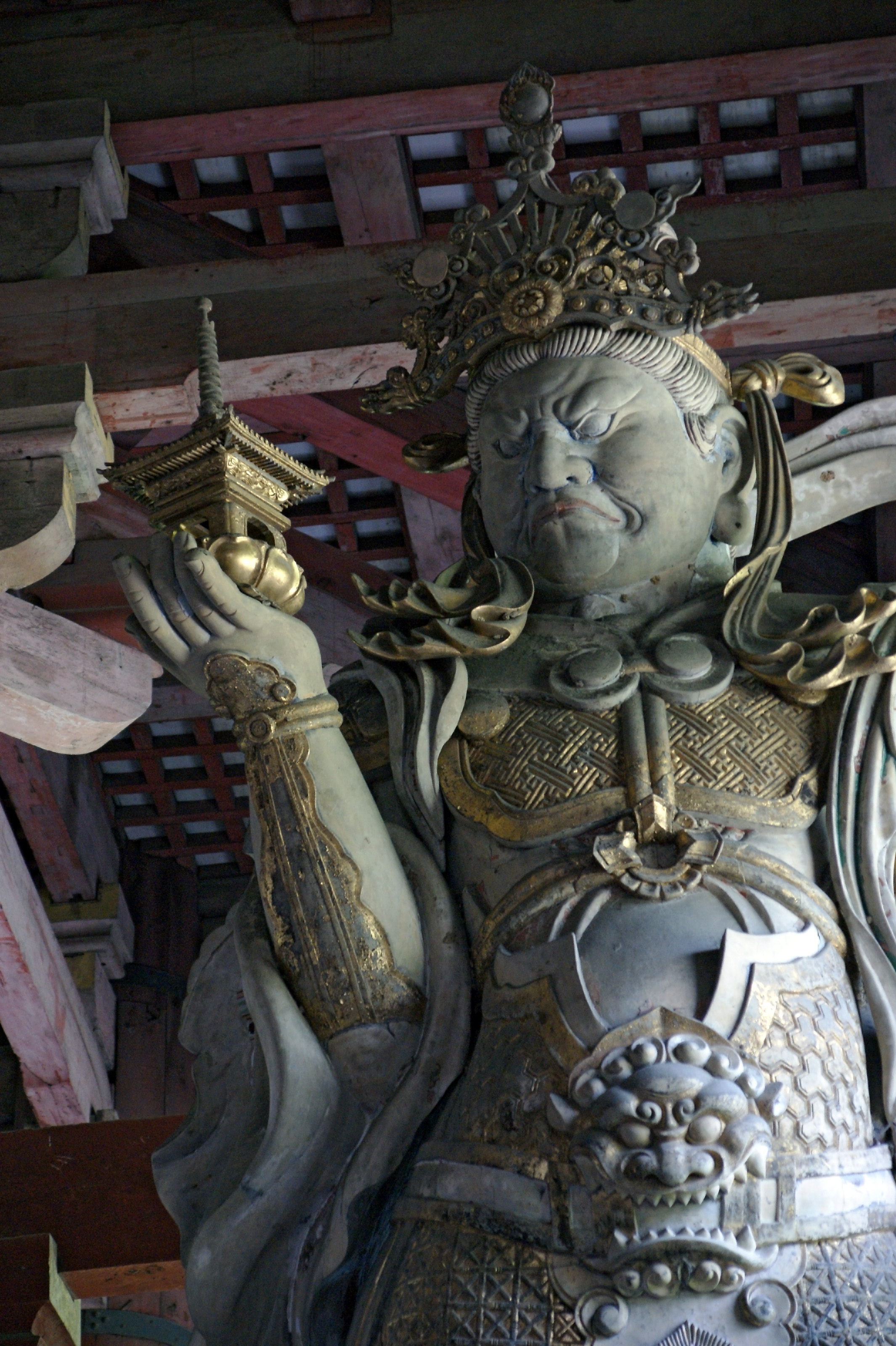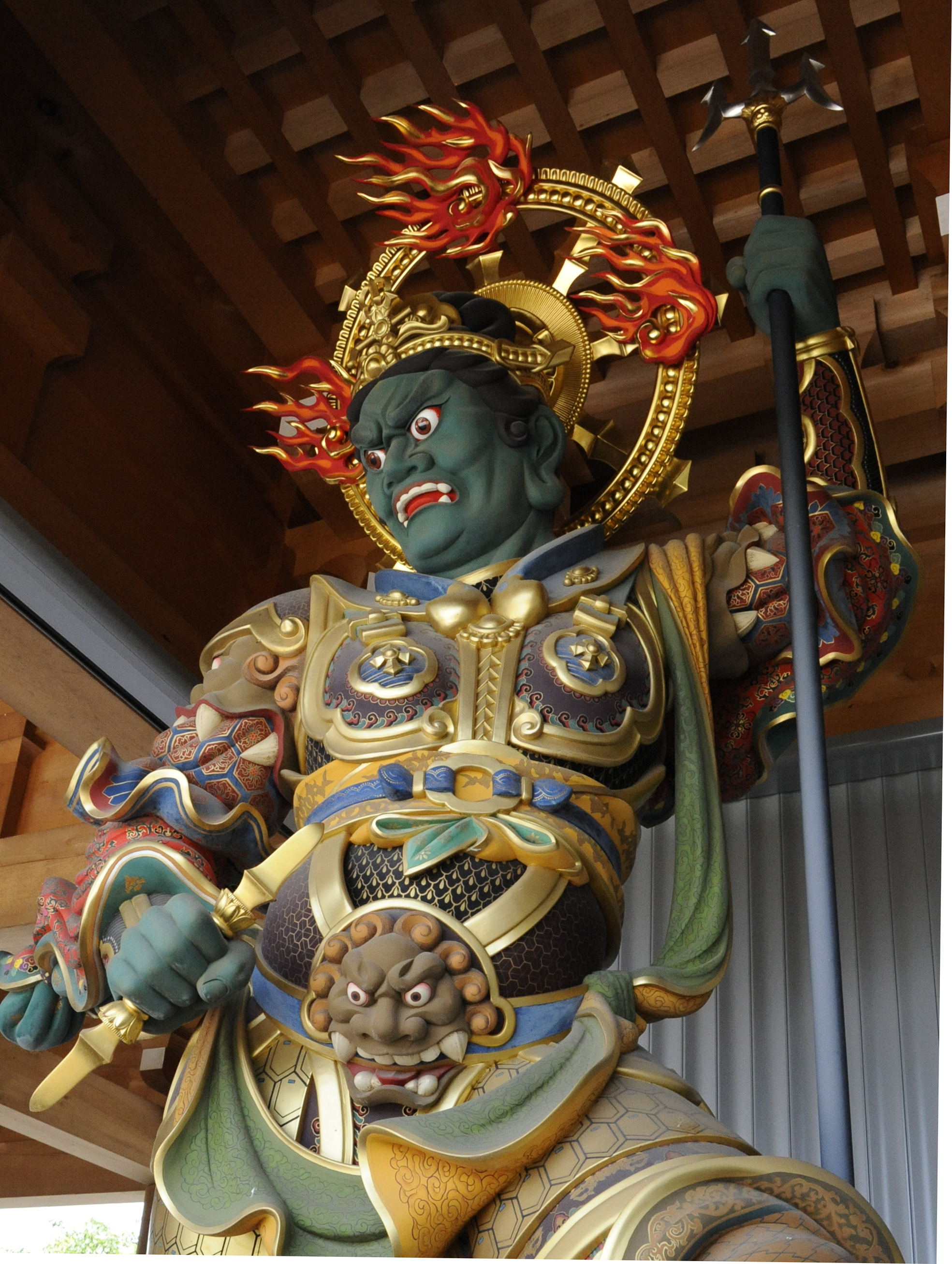|
Lokapala
Lokapāla ( sa, लोकपाल), Sanskrit and Pāli for "guardian of the world", has different uses depending on whether it is found in a Hindu or Buddhist context. * In Hinduism, lokapāla refers to the Guardians of the Directions associated with the eight, nine and ten cardinal directions. * In Buddhism, lokapāla refers to the Four Heavenly Kings, and to other protector spirits, whereas the Guardians of the Directions are referred to as the 'dikpālas' In Hinduism In Hinduism, the guardians of the cardinal directions are called the Lokapalas (लोकपाल), or Dikpalaka. The four principal guardians are: # Kubera (North) # Yama (South) # Indra (East) # (West) In Buddhism In Buddhism, lokapāla () are one of two broad categories of Dharmapāla (protectors of the Buddhist religion) -the other category being Wisdom Protectors. In China, "each is additionally associated with a specific direction and the Four Heraldic Animals of Chinese astronomy/astrology, ... [...More Info...] [...Related Items...] OR: [Wikipedia] [Google] [Baidu] |
Kubera
Kubera ( sa, कुबेर, translit=Kuberā) also known as Kuvera, Kuber and Kuberan, is the god of wealth, and the god-king of the semi-divine yakshas in Hinduism. He is regarded as the regent of the north (''Dikpala''), and a protector of the world ('' Lokapala''). His many epithets extol him as the overlord of numerous semi-divine species, and the owner of the treasures of the world. Kubera is often depicted with a plump body, adorned with jewels, and carrying a money-pot and a club. Originally described as the chief of evil spirits in Vedic-era texts, Kubera acquired the status of a '' deva'' (god) only in the ''Purana''s and the Hindu epics. The scriptures describe that Kubera once ruled Lanka, but was overthrown by his half-brother Ravana, later settling in the city of Alaka in the Himalayas. Descriptions of the "glory" and "splendour" of Kubera's city are found in many scriptures. Kubera has also been assimilated into the Buddhist and Jain pantheons. In Buddhis ... [...More Info...] [...Related Items...] OR: [Wikipedia] [Google] [Baidu] |
Guardians Of The Directions
The Guardians of the Directions (Sanskrit: दिक्पाल, Dikpāla) are the deities who rule the specific directions of space according to Hinduism, Jainism and '' '' Buddhism—especially . As a group of eight deities, they are called (अष्ट-दिक्पाल), literally meaning guardians of eight directions. They are often augmented with two extra deities for the ten directions (the two extra directions being zenith and nadir), when they are known as the . In Hinduism it is traditional to represent their images on the walls and ceilings of Hindu temples. They are also often portrayed in Jain temples, with the exception that Nāga usually takes the place of Vishnu in the nadir. Ancient Java and Bali Hinduism recognize , literally meaning guardians of nine directions, that consist of eight directions with one addition in the center. The nine guardian gods of directions is called ''Dewata Nawa Sanga'' (Nine guardian devata). The diagram of these guardian gods of ... [...More Info...] [...Related Items...] OR: [Wikipedia] [Google] [Baidu] |
Four Heavenly Kings
The Four Heavenly Kings are four Buddhist gods, each of whom is believed to watch over one cardinal direction of the world. In Chinese mythology, they are known collectively as the "Fēng Tiáo Yǔ Shùn" () or "Sìdà Tiānwáng" (). In the ancient language Sanskrit, they are called the "Chaturmahārāja" (चतुर्महाराज) or "Chaturmahārājikādeva": "Four Great Heavenly Kings". The Hall of Four Heavenly Kings is a standard component of Chinese Buddhist temples. Names The Kings are collectively named as follows: The Four Heavenly Kings are said to currently live in the Cāturmahārājika heaven (Pali: Cātummahārājika, "Of the Four Great Kings") on the lower slopes of Mount Sumeru, which is the lowest of the six worlds of the devas of the Kāmadhātu. They are the protectors of the world and fighters of evil, each able to command a legion of supernatural creatures to protect the Dharma. File:Guardian of Phra Meru Mas of Bhumibol Adulyadej - ... [...More Info...] [...Related Items...] OR: [Wikipedia] [Google] [Baidu] |
Yama (Hinduism)
Yama ( sa, यम), also known as Kala, and Dharmaraja is the Hindu god of death and justice, responsible for the dispensation of law and punishment of sinners in his abode, Yamapuri. He is often identified with Dharmadeva, the personification of ''Dharma'', though the two deities have different origins and myths. In Vedic tradition, Yama was considered to be the first mortal who died and espied the way to the celestial abodes; thus, as a result, he became the ruler of the departed. His role, characteristics, and abode have been expanded in texts such as the ''Upanishads'', the ''Ramayana'', the ''Mahabharata'' and the ''Puranas''. Yama is described as the twin of Yami, and the son of the sun god Surya (in earlier traditions Vivasvat) and Sanjna. He judges the souls of the dead and depending on their deeds, he assigns them to the realm of the Pitris (forefathers), Naraka (hell), or be reborn on the earth. Yama is aided by the god Chitragupta, who keeps a record of ever ... [...More Info...] [...Related Items...] OR: [Wikipedia] [Google] [Baidu] |
Indra
Indra (; Sanskrit: इन्द्र) is the king of the devas (god-like deities) and Svarga (heaven) in Hindu mythology. He is associated with the sky, lightning, weather, thunder, storms, rains, river flows, and war. volumes/ref> Indra's myths and powers are similar to other Indo-European deities such as Jupiter, Perun, Perkūnas, Zalmoxis, Taranis, Zeus, and Thor, part of the greater Proto-Indo-European mythology. Indra is the most referred deity in the '' Rigveda''. He is celebrated for his powers, and as the one who killed the great evil (a malevolent type of asura) named Vritra, who obstructed human prosperity and happiness. Indra destroys Vritra and his "deceiving forces", and thereby brings rains and sunshine as the saviour of mankind. He is also an important deity worshipped by the Kalash people, indicating his prominence in ancient Hinduism. Indra's significance diminishes in the post-Vedic Indian literature, but he still plays an important role in ... [...More Info...] [...Related Items...] OR: [Wikipedia] [Google] [Baidu] |
Vaiśravaṇa
(Sanskrit: वैश्रवण) or (Pali; , , ja, 毘沙門天, Bishamonten, ko, 비사문천, Bisamuncheon, vi, Đa Văn Thiên Vương), is one of the Four Heavenly Kings, and is considered an important figure in Buddhism. Names The name is a derivative (used, e.g., for patronymics) of the Sanskrit proper name from the root "hear distinctly", (passive) "become famous". The name is derived from the Sanskrit ' which means "son of Vishrava", a usual epithet of the Hindu god Kubera. is also known as Kubera and Jambhala in Sanskrit and Kuvera in Pāli. Other names include: * , a calque of Sanskrit ' * . This was a loanword from into Middle Chinese with the addition of the word "heaven, god" * , THL ''Namthöse'', "Prince All-Hearing", a calque of Sanskrit ' * mn, Баян Намсрай is a loan from Tibetan ''thos sras'', a short form of Tibetan ''rnam thos sras'' with the addition of an honorific * th, ท้าวกุเวร ''Thao Kuwen'' or ''Thao Wet ... [...More Info...] [...Related Items...] OR: [Wikipedia] [Google] [Baidu] |
Virūḍhaka (Heavenly King)
Virūḍhaka is a major deity in Buddhism. He is one of the Four Heavenly Kings and a dharmapala. Names The name ''Virūḍhaka'' comes from the identical Sanskrit term, which refers to sprouting grain. As such, his name means "increase" or "growth.". Other names include: *Traditional Chinese: 增長天; simplified Chinese: 増長天; pinyin: ''Zēngzhǎng Tiānwáng''; Japanese: ''Zōjōten'' or ''Zōchōten''; Korean: 증장천왕 ''Jeungjang Cheonwang''; Vietnamese: Tăng Trưởng Thiên, a calque of Sanskrit Virūḍhaka *Traditional Chinese: 毘楼勒叉; pinyin: ''Bí lóu lè chā''; Japanese: ''Birurokusha''; Korean: 비루늑차''Biluneugcha''; Vietnamese: ''Tỳ Lưu Ly.'' This is a transliteration of the original Sanskrit name. *Tibetan: འཕགས་སྐྱེས་པོ, Wylie: 'phags skyes po, THL: Pak Kyepo, "Noble Birth" *Thai: ท้าววิรุฬหก Thao Virunhok is an honorific plus the modern pronunciation of Pali Virūḷhaka. Characteris ... [...More Info...] [...Related Items...] OR: [Wikipedia] [Google] [Baidu] |
Virūpākṣa
Virūpākṣa (Sanskrit; Pali: Virūpakkha; traditional Chinese: 廣目天王; simplified Chinese: 广目天王; pinyin: ''Guǎngmù Tiānwáng''; Japanese: 広目天 ''Kōmokuten'') is a major deity in Buddhism. He is one of the Four Heavenly Kings and a dharmapala. Names The name ''Virūpākṣa'' is a Sanskrit compound of the words ''virūpa'' (ugly; deformed) and ''akṣa'' (eyes). Buddhaghosa interpreted ''virūpa'' as also meaning "various", which lends to the understanding that Virūpākṣa is endowed with clairvoyance. Other names include: *traditional Chinese: 廣目天王; simplified Chinese: 广目天王; pinyin: Guǎngmù Tiānwáng; Korean: 광목천왕 ''Gwangmok Cheonwang''; Vietnamese: ''Quảng Mục Thiên'', a calque of Sanskrit ''Virūpākṣa'' *Traditional Chinese: 毘楼博叉; pinyin: Bílóubóchā; Japanese: ''Birubakusha''; Korean: 비류박차 ''Bilyubagcha''; Vietnamese: ''Tỳ Lưu Bác Xoa''. This is a transliteration of the original Sanskrit ... [...More Info...] [...Related Items...] OR: [Wikipedia] [Google] [Baidu] |
Varuna
Varuna (; sa, वरुण, , Malay: ''Baruna'') is a Vedic deity associated initially with the sky, later also with the seas as well as Ṛta (justice) and Satya (truth). He is found in the oldest layer of Vedic literature of Hinduism, such as hymn 7.86 of the ''Rigveda''. He is also mentioned in the Tamil grammar work '' Tolkāppiyam'', as Kadalon the god of sea and rain. He is said to be the son of Kashyapa (one of the seven ancient sages). In the Hindu Puranas, Varuna is the god of oceans, his vehicle is a Makara (crocodile) and his weapon is a Pasha (noose, rope loop). He is the guardian deity of the western direction. In some texts, he is the father of the Vedic sage Vasishtha. Varuna is found in Japanese Buddhist mythology as Suiten. He is also found in Jainism. Etymology In Hindu tradition, the theonym ''Váruṇa'' (Devanagari: वरुण) is described as a derivation from the verbal root ''vṛ'' ("to surround, to cover" or "to restrain, bind") by mean ... [...More Info...] [...Related Items...] OR: [Wikipedia] [Google] [Baidu] |
Dhṛtarāṣṭra
Dhṛtarāṣṭra (Sanskrit; Pali: ''Dhataraṭṭha'') is a major deity in Buddhism and one of the Four Heavenly Kings. His name means "Upholder of the Nation." Names The name ''Dhṛtarāṣṭra'' is a Sanskrit compound of the words ''dhṛta'' (possessing; bearing) and ''rāṣṭra'' (kingdom; territory). Other names include: *Traditional Chinese: 持國天; Simplified Chinese: 持国天; pinyin: Chíguó Tiān; Japanese: Jikokuten; Korean: 지국천 Jiguk cheon; Vietnamese: Trì Quốc Thiên, a calque of Sanskrit ''Dhṛtarāṣṭra'' *Traditional Chinese: 提頭頼吒; Simplified Chinese: 提头赖吒; pinyin: Títóulàizhā; Japanese: Daizurata; Korean: 제두뢰타; Vietnamese: Đề-đầu-lại-tra. This is a transliteration of the original Sanskrit name. *Tibetan: ཡུལ་འཁོར་སྲུང, Wylie: yul 'khor srung, THL Yulkhor Sung, "Defender of the Area" * th, ท้าวธตรฐ Thao Thatarot is an honorific plus the modern pronunciatio ... [...More Info...] [...Related Items...] OR: [Wikipedia] [Google] [Baidu] |




.jpg)


